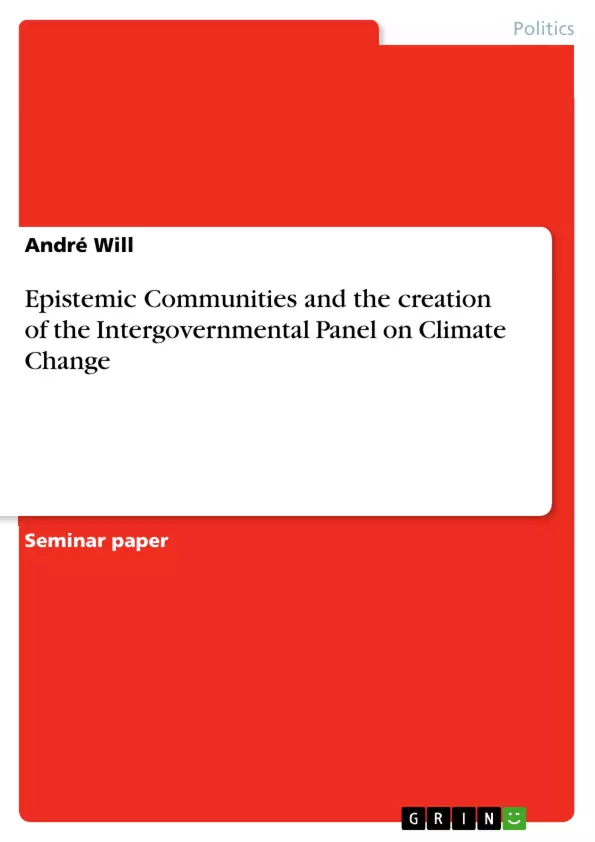In modern societies, science and scientific knowledge are considered to have a deep impact on society even beyond technological progress or economic growth. Science in general and scientific knowledge in specific represent an all-embracing power. They not only fundamentally determine how we see the world. They also influence political decision-making by providing new insights and altering how we perceive what societal and political issues are or how to solve them. Morisse-Schilbach even states: "It seems that the use of expert knowledge and especially scientific knowledge is increasingly integral to the way political and societal actors perceive and deal with political, economic, and social issues, both on the domestic and global scale."
This paper will analyze the influence of knowledge on the creation of international institutions. Led by the question "How did Epistemic Communities facilitate the creation of the Intergovernmental Panel on Climate Change (IPCC)?", the analysis starts with a brief introduction to epistemic communities. It will show how their work has an impact on political decision-making and how knowledge can cause demand for institutionalized cooperation. In particular, through the approach of weak cognitivism the following chapter provides theoretical background knowledge on how epistemic communities create institutions by providing knowledge and defining issues. Subsequent, the analysis continues with the development of "climate" to our modern understanding. The meaning of climate changed fundamentally through scientific findings and emphasized climate change as a global issue. In order to answer the research question, the knowledge of climate and ozone layer will be examined on its effect on the creation and expansion of referring institutions. Theoretically, pushed by knowledge, the perception of climate change as a global issue received broad attention by policy-makers. Rising perception eventually elevated "climate" to a global topic and caused need to act. Policymakers as well as referring epistemic communities cooperated globally and eventually created the Intergovernmental Panel on Climate Change.
Inhaltsverzeichnis (Table of Contents)
- Introduction
- Epistemic Communities and the establishment of IPCC
- Epistemic Communities and how they facilitate institutionalized cooperation
- Creation of the issue-area "climate" and the need for international cooperation
- Creation of the IPCC and its relation to climate scholarship
- Conclusion
Zielsetzung und Themenschwerpunkte (Objectives and Key Themes)
This paper aims to analyze the influence of scientific knowledge on the creation of international institutions. Specifically, it investigates how epistemic communities facilitated the establishment of the Intergovernmental Panel on Climate Change (IPCC). The paper explores the impact of epistemic communities on political decision-making and how the emergence of new knowledge can create a demand for institutionalized cooperation.
- The role of epistemic communities in shaping political decision-making
- The influence of scientific knowledge in creating demand for international cooperation
- The development of the concept of "climate" and its implications for global governance
- The impact of climate science on the formation of the IPCC
- The interplay between scientific knowledge and policy responses to climate change
Zusammenfassung der Kapitel (Chapter Summaries)
- Introduction: The introduction highlights the growing significance of science and scientific knowledge in shaping modern societies and influencing political decision-making processes. It establishes the central research question of the paper, which focuses on the role of epistemic communities in the creation of the IPCC.
- Epistemic Communities and the establishment of IPCC: This chapter introduces the concept of epistemic communities and their influence on international cooperation. It emphasizes their role as problem solvers and knowledge providers in policymaking. The chapter explores the assumptions of weak cognitivism, a meta-theory that underscores the importance of knowledge, ideas, and beliefs in shaping political actors' interests.
- Epistemic Communities and how they facilitate institutionalized cooperation: This chapter delves into the main assumptions of the epistemic communities approach, particularly the role of knowledge in driving demand for international cooperation. It explores the four stages of policy innovation: policy innovation, policy diffusion, policy selection, and policy persistence.
- Creation of the issue-area "climate" and the need for international cooperation: This section examines the evolving understanding of "climate" and its transformation into a global issue. It analyzes the scientific findings that have underscored the urgency of addressing climate change and the need for international cooperation.
- Creation of the IPCC and its relation to climate scholarship: This chapter focuses on the establishment of the IPCC and its connections to climate scholarship. It highlights the role of epistemic communities in shaping the agenda of the IPCC and advocating for international action on climate change.
Schlüsselwörter (Keywords)
This paper focuses on the interplay between scientific knowledge, political decision-making, and the creation of international institutions. Key terms and concepts include epistemic communities, weak cognitivism, climate change, international cooperation, Intergovernmental Panel on Climate Change (IPCC), policy innovation, and global governance.
Frequently Asked Questions
What are "Epistemic Communities"?
Epistemic communities are networks of professionals with recognized expertise and competence in a particular domain and an authoritative claim to policy-relevant knowledge within that domain.
How did these communities facilitate the creation of the IPCC?
They provided the scientific knowledge necessary to define "climate change" as a global issue, thereby creating a demand among policymakers for institutionalized international cooperation.
What is the concept of "weak cognitivism" in this context?
Weak cognitivism is a theoretical approach that emphasizes how knowledge, ideas, and beliefs shape the interests of political actors and drive the formation of international institutions.
What are the four stages of policy innovation described in the paper?
The stages are policy innovation, policy diffusion, policy selection, and policy persistence, all of which are influenced by epistemic communities.
Why was the emergence of scientific knowledge crucial for the IPCC?
Scientific findings fundamentally changed the understanding of climate from a local phenomenon to a global threat, forcing policymakers to act through global governance structures.
- Citation du texte
- André Will (Auteur), 2019, Epistemic Communities and the creation of the Intergovernmental Panel on Climate Change, Munich, GRIN Verlag, https://www.grin.com/document/540060



